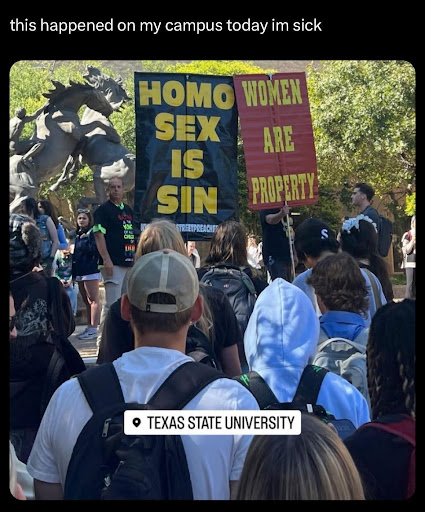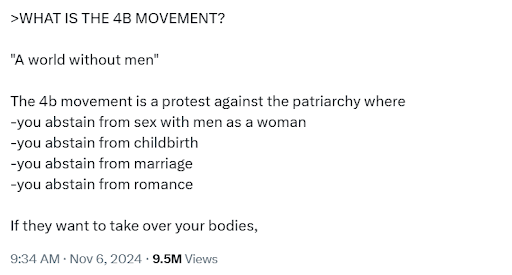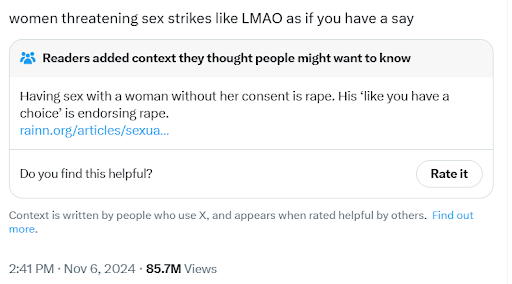Introduction
In the immediate aftermath of Donald Trump’s victory in the 2024 presidential election, social media was replete with reactionary misogynistic hate and vitriol. Election experts and disinformation observers pointed to the manosphere as the biggest catalyst of votes for Trump, suggesting that thousands of young men turned out late on election day to secure the 45th President’s second term. On X especially, scores of young male Trump supporters were celebratory, publicly affirming their hate towards women and women’s rights in an election that hung abortion and bodily autonomy in the balance (Figure 1). As they headed to the polls, many voters were concerned that under a new Trump administration, women and the LGBTQ+ community would be marginalised and that their reproductive rights would cease to exist. Messages on Gab and Truth Social, which serve as online hubs for the far-right, also included calls for violence and public executions against Trump’s political opponents.
This Insight will examine the extremist online responses to Trump’s win and will focus on the flood of misogynistic hate, male supremacy and calls for violence in an attempt to understand how a second Trump administration catalyses both online extremist mobilisation and resistance.

Figure 1. A post from a misogynistic Trump supporter celebrating his electoral win.
Male Supremacy, Misogyny and Hateful Discourse
In the hours following Trump’s election victory, self-proclaimed white nationalist Nick Fuentes was enamoured with a perceived newfound ability to control women’s reproductive rights. At 11:19 pm on election night, just mere minutes after Trump was declared victorious, Fuentes posted on X ‘Your body, my choice. Forever.’ His remarks allude to the potential for a highly divisive abortion policy under a second Trump administration, which many conservatives and right-wingers rallied for in the months preceding the election. The uber-controversial conservative playbook Project 2025, with which the Trump campaign was agreeable and somewhat aligned throughout the run-up to the election, outlines the pathway for conservative policy under a new Republican government. The political environment of 2024 was permeated by concern over the Project 2025 agenda on the left, and sparked major fear over its abortion policy goals and capacity for constraining women’s reproductive rights.
In the early hours of 7 November, a conservative influencer and podcaster with fringe platform ‘COMPOUND CENSORED, who went viral earlier in 2024 following an online racist rant containing ethnic slurs, posted a video saying, “I am honestly in awe…I hope that Trump crushes, no, holds barred abortion bans…fucking, just go fucking nuts, go full white nationalist ok, please…this can be the opportunity for a new era.”
On election day, an X user posted an image of pro-Trump signs on the campus of Texas State University. The image showed two individuals holding banners that read “Homo Sex Is Sin” and “Women Are Property” (Figure 2.) Largely in response to misogynistic messages from figures like Nick Fuentes and perceived legitimation of male supremacy under a Trump presidency, a number of women shared online messages aiming to catalyse an abstinence movement. In response to this, a post from a pro-Trump supporter on 6 November reads, “It hasn’t even been 24 hours since Trump won the election and women have already decided to stop being whores.” With this in mind, various X users posited that inceldom is an appropriate response to female abstinence. One user wrote, “Women use sex as a tool of political control over men. They hold no power over the man who is freed from the flesh.” A response to this comment read, “Women hate the incel because they hold no power over him.” In response to another message suggesting support for female abstinence that acquired over 6 million views and nearly 300 thousand likes, a user responded, “I agree, women need to stop acting like sluts. Wait until marriage.”
In a widely shared TikTok video circulated on X, a user reported that in the days following the election, schoolchildren in her local community reported to their parents that they had been harassed and bullied by boys at school, mentioning that they had been targeted by misogynistic remarks. These comments were repeated denigrations of reproductive rights and were copies of Nick Fuentes’ “your body, my choice” remarks.

Figure 2. Signs seen on the campus of Texas State University in the aftermath of the election.
Another message responding to a desire for abstinence reads, “Great! Trump’s victory helped liberal women to stop being whores…” Another reads, “Good! It’s about time yall sluts closed your legs!” In response to widespread misogynistic rhetoric online, women across social media have shown interest in South Korea’s 4B movement, a protest against misogyny and gender discrimination that calls for heterosexual women to abstain from dating, marriage, sex, and having children.

Figure 3. A post on X explaining the 4B movement. At the time of writing, this post received over 275 thousand likes and 41 thousand reposts.
In response to the post shown in Figure 3, the misogynist influencer Andrew Tate, who has been charged with rape and human trafficking, posted, “24 hours and Trump has stopped hoes being hoes. Now you dont even need abortions! Well done Mr President!” In a different post that acquired over 3.8 million views and 261 thousand likes, an X user wrote that male loneliness is not the appropriate diagnosis of misogyny. Rather, it’s “more of a ‘young men becoming nazis at a concerningly high rate’ epidemic.” A user responded to this saying, “Sluts please close your legs.” In a video widely shared on social media, a woman questioned anti-Trump women voters about what they had actually lost as a result of Trump’s victory. Affirming support of this question, a user wrote, “To be a slut and murderer.”

Figure 4. Depicting a tweet and community note that went viral.
Furthermore, one X user wrote, “women threatening sex strikes like LMAO as if you have a say.” The post garnered over 60 million views. The post was not removed; however, it now features a community note stating, “Having sex with a woman without her consent is rape. His ‘like you have a choice’ is endorsing rape” (Figure 4). In response to a message expressing concern over the depletion of reproductive rights, a user posted, “Freaks, whoremongers & whores, syphilis diseased abortion murderers is all u r!”
Extremist Rhetoric, Accelerationism and Calls for Violence
In both the buildup to and the moments after the election, far-right users felt emboldened by the very thought of a new Trump presidency. In the days preceding the election, various posts calling for extremist action spread on Truth Social. One user posted, “Many many executions are warranted. These traitors are a terminal cancer that MUST BE completely eradicated to make America healthy again. RFK Jr. will get his Kennedy retribution against the assassins who decimated his family” (Figure 5). While politics and technology outlet WIRED reported that this message came as a celebration of Trump’s win, this post was actually made on 3 November, two days before the election and highlighting that online extremism was bursting at the seams even before election day.

Figure 5. A post from a Truth Social user calling for executions of Trump’s enemies.
As reported on X by Pop Fusion HQ, an observer of pop culture trends, “Over 4.4k deaths by alcohol and 1.9K deaths by suicide has been occurring following the 2024 Presidential Election results. That number continues to rise by the hour.” While these statistics were left without a source and are difficult to verify, an ultra-conservative right-wing influencer quoted the post and said, “Keep going,” asserting support for the deaths of individuals mentally struggling with the election results (Figure 6).

Figure 6. A tweet promoting suicide.
A post from a right-wing news account on 6 November reads, “Its time to convert every MAGA voter you know into a far right extremist.” The post acquired over 135 thousand views at the time of writing (Figure 7).

Figure 7. A post from a right-wing news account on X.
On 6 November, extreme-right observer Right Wing Watch posted a video on X of a Christian nationalist appearing to galvanise an upheaval of government and society. A Trump win, he says, provides an ‘opportunity to tear down the gates of hell in government. We’ve got one administration, one four year period to do it.”
While much of the hateful post-election discourse emanated from the extreme right, those who opposed the new Trump presidency also engaged in violent rhetoric in the aftermath of the election. In a TikTok clip widely shared on X, an anti-Trump voter asked the online community “how to find or hire a hitman,” remarking that “I think we can pull this off collectively…if you want to chip in, DM me.” On an Instagram post reporting Trump’s win, a user posted a comment reading “honestly i think we should all pool some money together and hire some hitmen.” This comment acquired almost 3,000 likes at the time of writing. Furthermore, another user wrote, “At this point I’m a full accelerationist. America chose hell, they deserve to get it. Even if the whole world suffers as a result, it’s a price worth paying for salvation.” (Figure 8.)

Figure 8. A post from an anti-Trump user.
Recommendations
To address the saturation of extremist rhetoric and misogyny on social media, tech companies might develop and enforce clear policy frameworks supplemented by machine learning algorithms and human review processes. Artificial intelligence (AI) systems might be harnessed to modify recommendation engines in order to reduce the visibility of hateful content. BiCapsHate, an AI model developed by researchers at the University of York, focuses on analysing the specific context of online hate speech. The system then translates this identified language into quantitative data to better understand potentially harmful posts. Platforms like X might integrate such technologies in order to better understand how online hate speech develops and spreads. Over ten years ago, X (formerly Twitter) employed IBM’s Watson system to sift through posts, which then flagged content that violated platform policy. X might reintegrate these language processors in order to better mitigate hateful content.
To balance the freedom of expression with the reduction of hate speech, an appeals process might be implemented for fair content removal processes. Additionally, a revised user interface (UI) design might discourage the spread of extremist concern, such as the inability to share content that is flagged as potentially harmful.
Combatting misogynistic narratives, particularly those rooted in mis- and dis- information requires increased attention to media literacy, especially in young people. This entails encouraging education of common persuasive narratives and techniques that lead to potentially harmful beliefs and gendered stereotypes.
